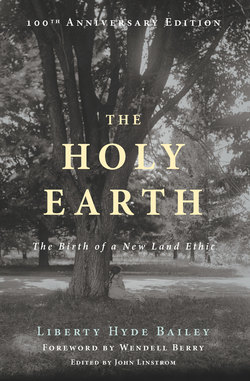Читать книгу The Holy Earth - Liberty Hyde Bailey - Страница 12
На сайте Литреса книга снята с продажи.
ОглавлениеThe earth is good
It is good to live. We talk of death and of lifelessness, but we know only of life. Even our prophecies of death are prophecies of more life. We know no better world: whatever else there may be is of things hoped for, not of things seen. The objects are here, not hidden nor far to seek: And God saw everything that he had made, and, behold, it was very good.
These good things are the present things and the living things. The account is silent on the things that were not created, the chaos, the darkness, the abyss. Plato, in the “Republic,” reasoned that the works of the creator must be good because the creator is good. This goodness is in the essence of things; and we sadly need to make it a part in our philosophy of life. The earth is the scene of our life, and probably the very source of it. The heaven, so far as human beings know, is the source only of death; in fact, we have peopled it with the dead. We have built our philosophy on the dead.
We seem to have overlooked the goodness of the earth in the establishing of our affairs, and even in our philosophies. It is reserved as a theme for preachers and for poets. And yet, the goodness of the planet is the basic fact in our existence.
I am not speaking of good in an abstract way, in the sense in which some of us suppose the creator to have expressed himself as pleased or satisfied with his work. The earth is good in itself, and its products are good in themselves. The earth sustains all things. It satisfies. It matters not whether this satisfaction is the result of adaptation in the process of evolution; the fact remains that the creation is good.
To the common man the earth propounds no system of philosophy or of theology. The man makes his own personal contact, deals with the facts as they are or as he conceives them to be, and is not swept into any system. He has no right to assume a bad or evil earth, although it is difficult to cast off the hindrance of centuries of teaching. When he is properly educated he will get a new resource from his relationships.
It may be difficult to demonstrate this goodness. In the nature of things we must assume it, although we know that we could not subsist on a sphere of the opposite qualities. The important consideration is that we appreciate it, and this not in any sentimental and impersonal way. To every bird the air is good; and a man knows it is good if he is worth being a man. To every fish the water is good. To every beast its food is good, and its time of sleep is good. The creatures experience that life is good. Every man in his heart knows that there is goodness and wholeness in the rain, in the wind, the soil, the sea, the glory of sunrise, in the trees, and in the sustenance that we derive from the planet. When we grasp the significance of this situation, we shall forever supplant the religion of fear with a religion of consent.
We are so accustomed to these essentials — to the rain, the wind, the soil, the sea, the sunrise, the trees, the sustenance — that we may not include them in the categories of the good things, and we endeavor to satisfy ourselves with many small and trivial and exotic gratifications; and when these gratifications fail or pall, we find ourselves helpless and resourceless. The joy of sound sleep, the relish of a sufficient meal of plain and wholesome food, the desire to do a good day’s work and the recompense when at night we are tired from the doing of it, the exhilaration of fresh air, the exercise of the natural powers, the mastery of a situation or a problem, — these and many others like them are fundamental satisfactions, beyond all pampering and all toys, and they are of the essence of goodness. I think we should teach all children how good are the common necessities, and how very good are the things that are made in the beginning.
